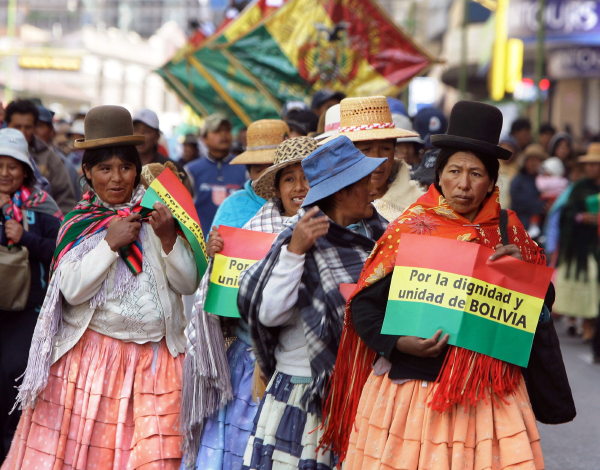 (above) Supporters of Bolivia's President Evo Morales hold signs in Spanish that read: "For the dignity and unity of Bolivia," in La Paz, Bolivia, on Monday. Mr. Morales reportedly has lost control over the eastern half of his country. (Photo: Associated Press)
(above) Supporters of Bolivia's President Evo Morales hold signs in Spanish that read: "For the dignity and unity of Bolivia," in La Paz, Bolivia, on Monday. Mr. Morales reportedly has lost control over the eastern half of his country. (Photo: Associated Press)
Summit of leaders aims to end crisis in Bolivia
Morales describes unrest as 'civic coup'
September 16, 2008 - Washington Times (AP)
Eva Vergara ASSOCIATED PRESS
SANTIAGO, Chile | South America's presidents converged on Chile for an emergency summit Monday aimed at preventing the collapse of Bolivia, whose leftist president has essentially lost control of half the country and said bloody unrest there amounts to an attempted coup.
Evo Morales said he would explain to his fellow presidents how his political foes in Bolivia's rich eastern lowlands have mounted a "civic coup," inciting "crimes against humanity by groups massacring the poorest of my country."
At least 30 people were killed in political violence last week, prompting Bolivia's first indigenous president to declare martial law in the rebellious state of Pando - where Mr. Morales says thugs used machine guns against his supporters - and seek the arrest of its governor.
Gov. Leopoldo Fernandez denied any responsibility for the deaths, calling it an armed clash between rival groups and accusing Mr. Morales of "mounting a farce."
Mr. Morales has lost control over most of eastern Bolivia, where protests have blocked highways and closed border crossings and pipeline sabotage has forced a cutoff of nearly half his nation's natural gas exports to Brazil.
Many of the blockades were dismantled as a goodwill gesture on Sunday as both sides sought to establish ground rules for negotiations. While Bolivia was generally quiet Monday, more than a thousand Morales supporters marched on the U.S. Embassy in the capital of La Paz.
Mr. Morales expelled Washington's ambassador last week, accusing him of encouraging the unrest in eastern Bolivia.
Before departing Sunday, Ambassador Philip Goldberg called the allegation "false and unfounded." Venezuela's president, Hugo Chavez, also expelled the U.S. ambassador in his country last week in solidarity with Mr. Morales, his closest ally on the continent.
"If he hadn't expelled him, we would be tearing down the U.S. Embassy today," protest leader Edgar Patana said as activists burned an American flag and effigies of opposition governors.
In Chile, Foreign Minister Alejandro Foxley said the presidents would try to get talks going after a failed attempt last week by diplomats from Argentina, Colombia and Brazil. The Organization of American States Secretary General Jose Miguel Insulza was also attending, as were presidents for all major South American nations except Peru.
Meanwhile Mr. Morales' vice president, Alvaro Garcia, met for seven hours Sunday night with Tarija Gov. Mario Cossio, who was representing the opposition governors, to try to establish ground rules for talks.
This is the gravest challenge to Mr. Morales's nearly three-year tenure as Bolivia's first indigenous president. The provinces that hold Bolivia's natural gas riches and its best farmland want more autonomy.